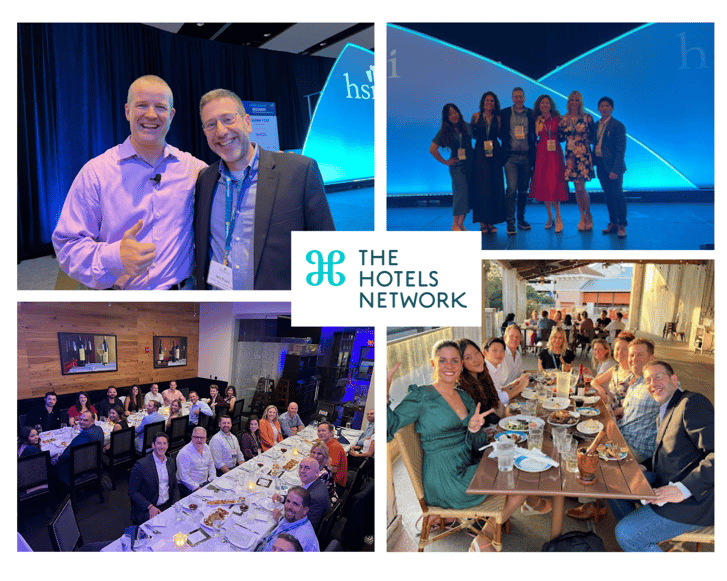At the end of June, I attended the HSMAI Commercial Strategy week in Orlando. It was a valuable chance to connect with colleagues and the wider industry, and there were a number of enlightening presentations that mapped out the present circumstances and the possible future of our industry – insights that I would like to share with you here.
Sunday, June 26
After saying goodbye to my family, I caught the Lyft to the White Plains, NY airport where I bumped into colleagues heading to the conference. We arrived in Orlando late Sunday night and I made my way to the Rosen Centre Hotel, which is connected to the humongous (understatement) Orlando Conference Center. This was, I thought, a strategic place to stay, but it turned out the event was closer to the Rosen Plaza Hotel, half a mile away on the other end of the conference center. As I would discover over the course of the week, the one consistent topic of conversation with each attendee of the conference was a comparison of how many steps they took during the conference. The highest number I heard of was around 16,000 in a day!
Monday, June 27
Monday morning, I met with my company team (Mercedes Blanco, Carrie Ell, Natalie Kim, Elena Cowell, and Rhett Cai) over a delicious buffet breakfast at Shingles Creek to discuss the upcoming conference. Afterwards, I headed to the conference center, where I was greeted by Jenny Teeson, Renee Blessing, and the rest of the HSMAI team. I printed out my name tag and then they told me to get some, as I call it, flair, which were ribbons that show your engagement with HSMAI. After picking the appropriate ones, I headed into the conference showcase area, where The Hotels Network had a booth strategically located right by the entrance. Elise Rhinehart went over the partner's folder with me regarding contact names and other useful information. I was happy to see The Hotels Network sponsored as a Silver Partner.
In a breakout room, I met with Jessica Davidson and also Stephanie Smith, who leads the Rising Leader Task Force for the HSMAI Marketing Advisory Board. HSMAI started the Rising Marketing Leaders group this year and I am proud to join them as one of the inaugural advisors on the committee, along with Kate Lochridge, Nima Vaez-Zadeh, Dan Fernandez, Sean Brevick, Carolyn Hosna, and Katie Johnson. After months of zoom calls, it was exciting to meet the group for the very first time face to face. Our three-hour session was extraordinarily productive and we received terrific initial feedback from the rising leader members. Jessica and Stephanie led the first part of our three-part agenda with a focus on crafting elevator pitches. Then Karen Wollard of HSMAI and Kate Lochridge talked about the concept behind StrengthFinders and how to look at your results. Finally, for the last portion of the agenda, I initiated the first mentor-mentee program for HSMAI’s Rising Leader council, where we matched each Rising Leader with a board member for a three-month mentorship.
To conclude the meeting, we all went to a VIP happy hour for Marketing Advisory Board Members, Rising Leader members, and others. It was a terrific event to finish off the day, get reacquainted with people, and talk about the coming conference. After the happy hour, The Hotels Network team joined the GCommerce team for dinner and even more late evening drinks to reflect on the day and prepare for the upcoming marketing and revenue conference sessions.
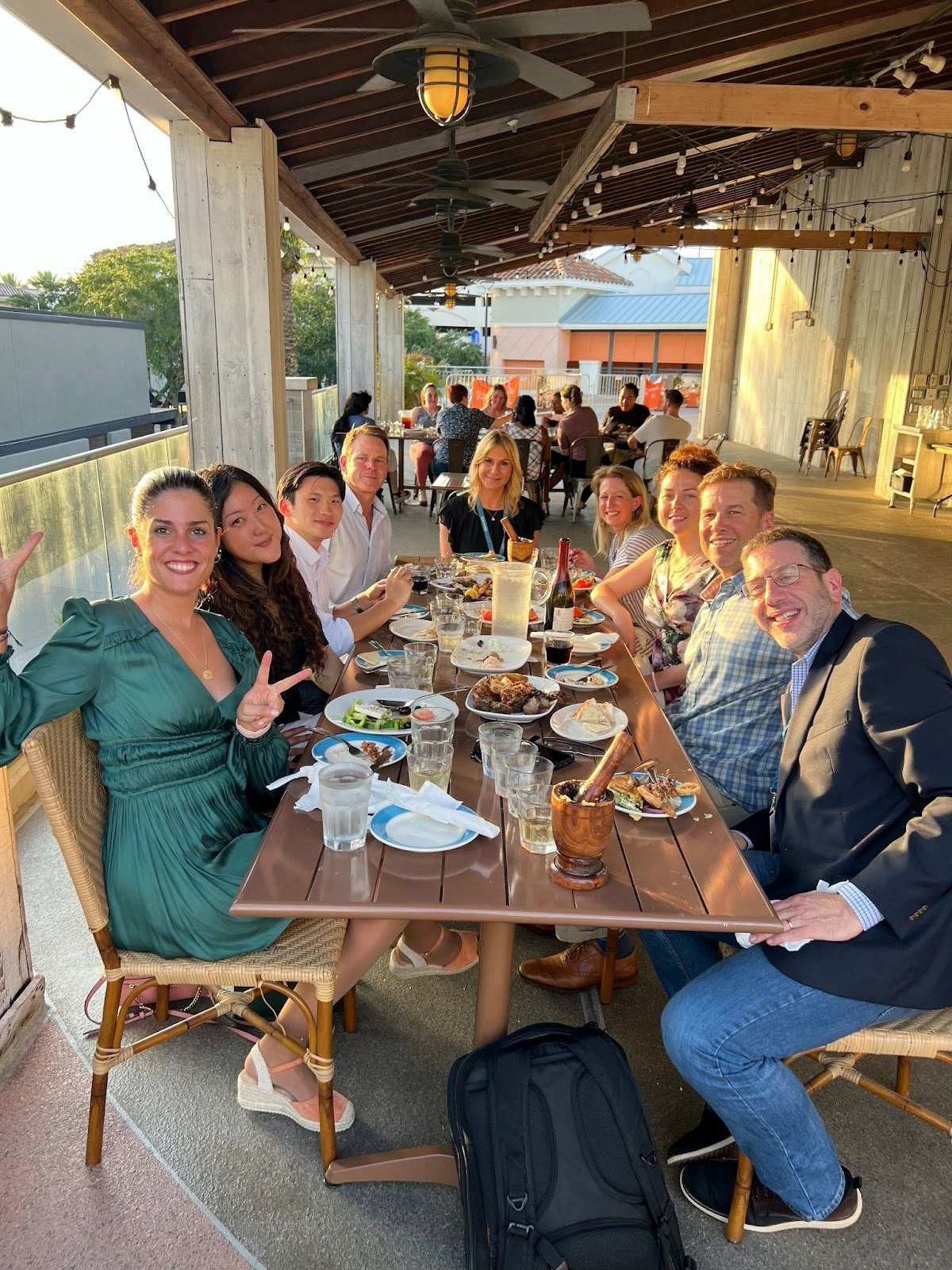
Tuesday, June 28
It’s Conference Day for the Marketers!
I believe if you’re not early, you’re late. So I head over to the conference center early, grab some breakfast, and find a seat towards the front with members of the Rising Leader Council. From the corner of my eye, I see Dave Roberts, the Master of Ceremonies as well as one of my son’s favorite professors at Cornell. I take the chance to introduce myself and take a selfie to text to my son. Always looking for an opportunity to get some cred with my kids!
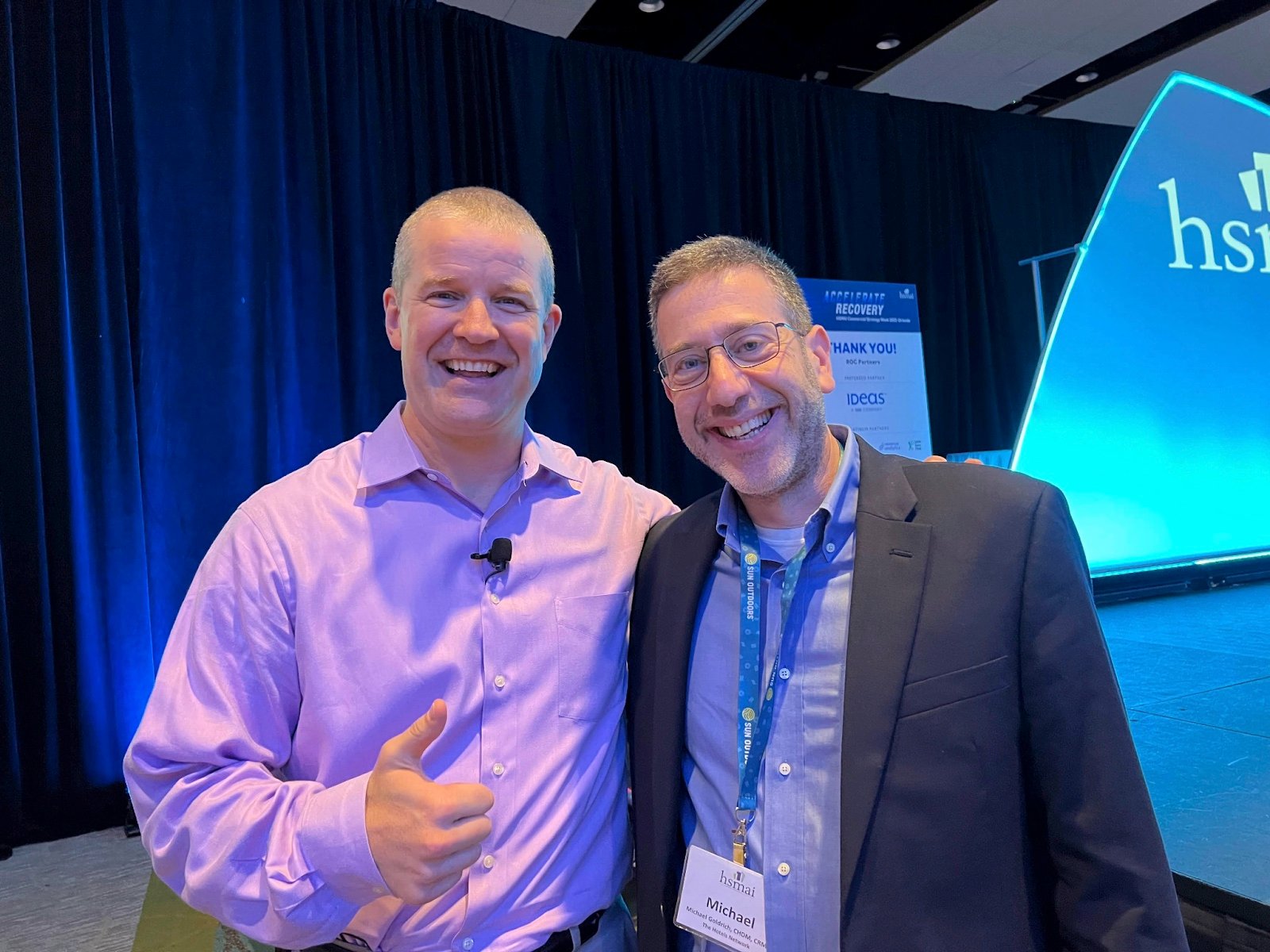
Dave Roberts kicks off the meeting by setting up the ground rules and sharing the agenda. I planned out the first day in such a way that I’m attending a session at every time period to maximize my learning opportunities to stay up to date. The first session begins, and I take notes as fast as my fingers can type.
The keynote was delivered by Daniel Levine, Executive Director of the Avant Guide Institute. In his speech he addressed global trends and evolving customers… and what those mean for hotel marketing. Levine began by establishing the distinction between a trend and a fad by using a slew of fad photos that will come and go very quickly – indeed, most have already passed. Trends, however, are something you can make a business plan around. They mark common changes in sentiment in any measurable direction, and indicate where future opportunities will lie.
Here are the five big trends he sees now:
- Holistic Mindset: The idea of work-life balance has changed in the last few years to a concept of work-life integration.
- Swift Assistance: The world is moving faster and faster and people are researching, both B2C and B2B, at 3 a.m. from their beds. Businesses therefore need to be ready to call/text/email/message 24/7/365.
- Braggable Luxury: Over the course of the pandemic, ideas of luxury have shifted. Consumers are increasingly defining luxury as something they can brag about.
- Honest Communication: Consumers are increasingly looking for brands that will interact with them clearly and honestly.
- Phygital Interaction: This is a combined physical and digital experience where a digital touchpoint is required to complete a physical experience.
Expanding on the trends outlined above, Levine posited a series of questions in terms of how they relate to hospitality:
- How can we increase holistic touchpoints with our guests?
- How can I increase these touchpoints with my team?
- How can we make touchpoints faster and easier for guests?
- What channels can we open to better serve guests?
- What other ways can we empower guests to self-help?
- What can we change in order to be perceived as more honest and fairer?
- How can we make our offerings even more clear?
- How can we help guests brag more?
- What tech will really make things easier for us or for our guests?
- How can we take more advantage of the tech guests are already carrying?
Next, I chose to go to A New Framework for Converging Sales, Marketing & Revenue Optimization with Ed Skapinok, Lovell Casiero, and Tina Meredith. I picked this breakout because I’ve been thinking a lot about the convergence of the revenue manager and marketing manager roles in hotels and I was wondering how they viewed convergence. The session was very interesting, and Ed shared his journey to launch Appellation and how they have a unique opportunity to establish best practices that easily scale up and down based on the marketing conditions. He brainstormed and came up with over 100 processes undertaken by sales, marketing, and revenue, and then he grouped them to find areas of overlap. This is what he found in seven key areas:
- Finding customers
- Communicating and promoting
- Monitoring the competition
- Creating content
- Managing performance
- Managing relationships
- Working with operations
After Ed finished talking, Tina and Lovell talked about the convergence they did at PM Hotel Group to drive efficiency and effectiveness.
After that session ended, I stayed put and watched the Atlantis team. The topic of this session was like the previous one with a bit of a twist. It included tech! The topic was: Embracing Marketing-Technology Convergence, led by Isaac Gerstenzang, Danirose Barry, and Georgia Britton. They talked about how they broke the silos across departments to drive bookings. In their presentation they focused on several key areas: setting the stage, guest journey, and finished up with a case study of the new Atlantis mobile app. They shared key facts, for instance that 73% of guests want to use their mobile device to manage their experience. Isaac said guests want a self-service experience that is seamless and on-brand. The guest journey was looked at through the lens of the website, booking engine, guest check-in, key, door locks, CRM, and mobile app. They then stepped through each of these with the convergence and input required from Marketing, Revenue, and Technology. The case study of the new Atlantis app highlighted several exciting developments: an interactive map, dining reservations, experience reservations, cabana reservations, self-guided property tours, daily news, and live chat with guest services.
It had been a busy morning, and lunch break gave us all a chance to gear up for the exciting Lightning Rounds. These were sessions where, in six minutes and 40 seconds, and without control of the PowerPoint slides, each presenter needed to deliver a presentation on their subject. The slide would move forward every 20 seconds whether they were ready or not! This year the presenters were: Mercedes Blanco, Stephanie Smith, John Jimenez, Lori Kiel, and Ashley Sellhorst. The topics ranged from The Death of the Marketing Plan to Confronting Your Fear. Everyone did an amazing job!
The next session was especially rewarding for me personally. Last year, I put together a Collaborate session and I was happy to see its return this year. The session has six individual roundtable breakouts and three back-to-back mini sessions that last 13 minutes. At the end of the 13 minutes, everyone moves to a different table except the table host. This year the Rising Leader Council organized the session with topics ranging from:
- Doing More with Less
- Authentically Incorporating DEIM In Your Team
- Engaging Gen Z (the New “Millennials”)
- Leveraging Loyalty to Drive Bookings
- Identifying Your Niche and Attracting New Audiences
- Fighting For “New” Marketing Initiatives In Your 2023 Budget.
Each table had to come up with one “aha!” moment, which was then posted to the online board.
The next session I attended was one of the few repeated sessions of the day, A Hotel Marketer’s Guide to the Metaverse. Essentially, the Meta team got up and talked about what they see happening in the near term and long term regarding developments in the metaverse. They believe it will take us between 10-15 years to realize the full potential of the metaverse. At present, the metaverse is experienced primarily through 2D apps. However, Meta believes that we can soon expect bridges from 2D apps to more immersive 3D experiences.
The key takeaways for hotels were:
- Build for the future via AR/VR and mixed reality
- Inspire new connections via reels, creators, branded content
- Reduce friction and deepen loyalty via business messaging.
The final session of the day before we broke for the reception was Debra Jasper, Ph.D., CEO & Founder, Mindset Digital with the topic: It’s the Little Things: Small Screen, Big Impact.
She talked about three ways to break through the noise so we can all become better virtual communicators. First, she discussed two curses:
- Curse of Competition: There is so much distraction in today’s world that simply to get a person’s attention is a challenge.
- Curse of Knowledge: We know what makes sense to you and you send it out but it may not make sense to others. We all talk in the tribal languages of our profession.
She emphasized that we all need to become virtual communicators. To achieve this, we need to do the following:
- Make every touchpoint count.
- Our personal online profile should convey that we are likeable and relatable.
- Present with power – no data dumps. Design presentations for attention.
Tammie Carlisle and Jeremy Murray are two leaders from the Marketing Advisory Board who deserve shoutouts for helping organize the day's education sessions. After the sessions ended, the networking continued during the reception as people made plans to go to dinner with partners and colleagues. The dinner The Hotels Network team attended included members from the Sojern, SiteMinder, Duetto teams as well as our invited guests. After dinner, people attended VIP parties where the networking continued late into the evening.
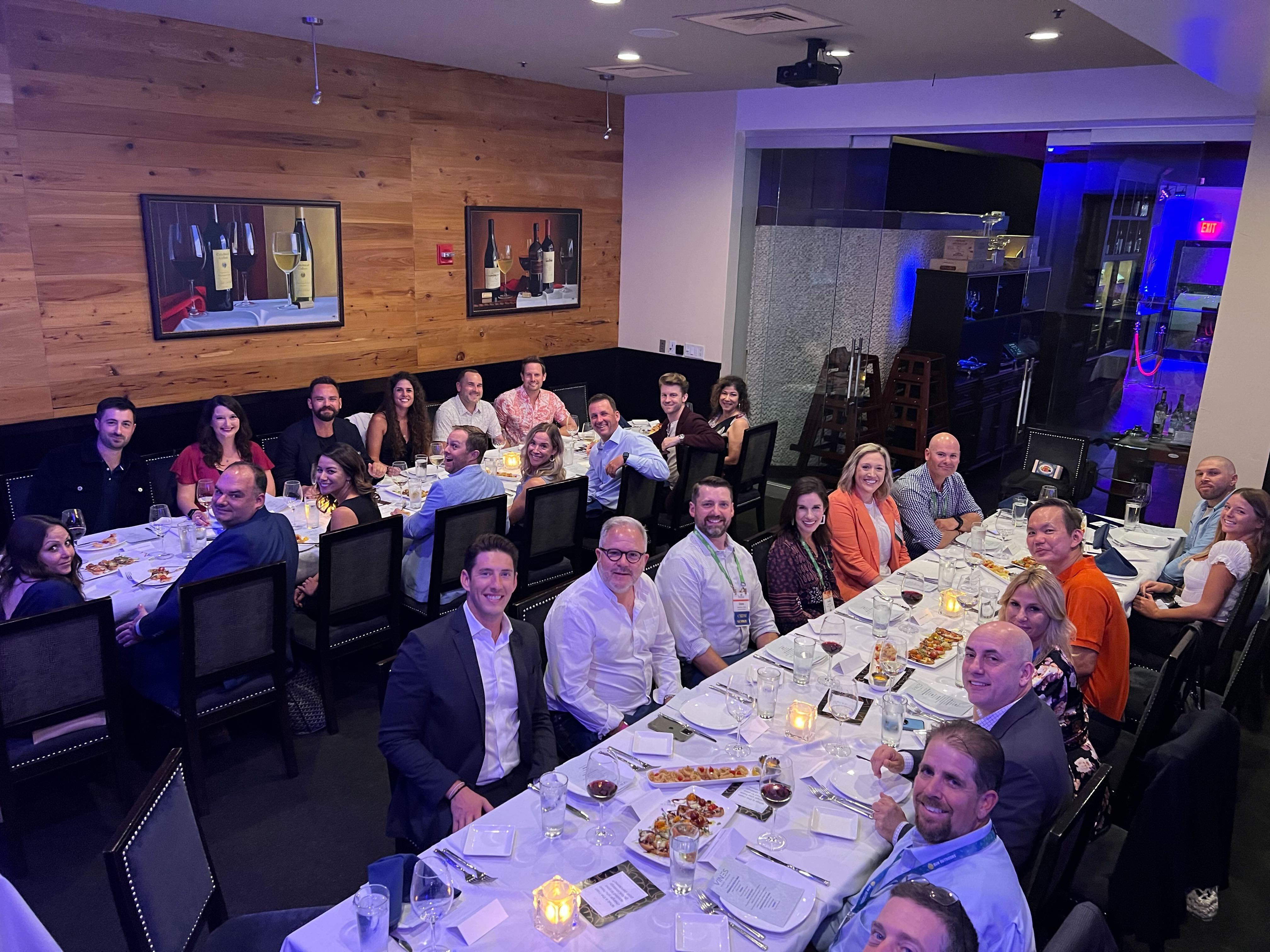
Wednesday, June 29
It’s Conference Day for the Revenue Managers!
Again, I arrived early (this time a bit too early) to gather my breakfast and find a seat. Dave Roberts was once again the MC, and after the awards, Adam Sacks shared an economist’s view on the travel industry. His enlightening presentation made a number of intriguing points. First, the US travel sector has experienced an “unprecedented” recovery, with hotel demand back to pre-pandemic levels, short-term rentals far ahead, and air travel at around 90%. The economic fundamentals of corporate performance, employment, household savings, and income growth are all favorable. Then, Sacks turned to the twin-headed monster of labor and prices, predicting that labor force shortages will limit air travel recovery and continue to put pressure on prices. The weapon to slay the monster is interest rates, but raising interest rates quickly could bring about a recession. While the recession is possible (70% of economists expect a recession by end of 2023), it would likely be modest and short-lived. Overall, therefore, travel is well-positioned to continue its forward progress. Weekend occupancy is 100% recovered. Weekdays (Sunday-Thursday) are still at 90%. Business travel will continue towards a “return to normal” and household finances, along with pent-up demand, should prevent a typical exaggerated drop.
Every slide Sacks presented felt like gold, as the numbers he shared (except for inflation/labor) were so much better than in the last few years. Here are a few highlights:
- GOP margin highest since October 2018 and the third-highest ever.
- Traveler intention to travel remains high, around 91%.
- Trip volume is at 81% this year and projected to be 96% next year.
- Nearly 100% of US companies are traveling now or planning to soon.
- Groups are getting a massive cut on ADR right now.
- US destination website searches remain above 2019 levels.
- The US domestic leisure market has recovered, though it faces much slower growth ahead.
- Room demand hits breakeven this summer, and additional gains will be modest.
- Inflation-adjusted ADR outlook keeps pace.
- RevPAR fully recovered this year, but 2024 in real terms (when adjusted for inflation) compared to 2019. RevPAR is 10% ahead of the summer of 2019.
After Sacks’s heartening presentation, I headed over to a breakout session, Digital Marketing Takeaways for Revenue Managers, with Dan Fernandez, Christina Davis, and Haley White.
They shared that Google Travel is creating new ways to get in front of customers. Brand metasearch ads allow you to shift share and reduce marketing costs, while non-branded metasearch ads will allow you to introduce your property to new customers.
When talking about non-Google metasearch opportunities, companies should consider Trivago, TripAdvisor, and Kayak. This is the very top of the funnel, allowing companies to influence and gain awareness of consumers who were not specifically looking for your property. It allows you to control distribution costs and increase loyalty and guest lifetime value. The ROAS is around 85% compared to Google Meta, and the cost per click is historically lower. It’s less scalable, however, what it lacks in scalability it makes up for in novelty and opportunity to gain market share.
When it comes to Expedia, they discussed Accelerator, TravelAds, and Display as the three ways to leverage their offerings to increase visibility, increase messaging, and leverage data and insights to maximize bookings.
Following this presentation, I attended a discussion breakout session called Is RevPAR Enough? Considerations For a Profitability-Focused Commercial Strategy, led by David Warman. Questions to the group included the following as conversation starters:
- Do we think developing a profit-centered commercial strategy is important? What level of urgency does it have for our organization?
- What first steps could our organization take to be profit centered? What might prevent progress in these steps?
- What KPIs will we focus on to evaluate our profit-centered commercial strategy?
- What are the biggest data challenges we will encounter in trying to build a profit-centered commercial strategy?
Feeling energized after a productive morning, I grabbed a delicious lunch and chatted with colleagues, and then attended The Views from the Top with Dawn Gallagher, Lori Kiel, Raul Moronta, which was moderated by Jennifer Hill, before heading over to HiTEC to view the showcase. I was completely blown away by the number of booths, the foot traffic, and the engagement of participants/vendors. It made me feel very hopeful that everything is finally returning to normal.
I then attended the Collaborate session hosted by the Rising Leaders on the Revenue Council. The format was similar to that set up by the marketing leaders. The table topics included:
- Growing Non-Rooms Revenue
- The Guest Experience vs. Bottom Line
- How to Do More With Less
- Personal Wellness in Hospitality
- Talent Hiring, Retention, and Training
- Driving Direct Booking Strategies
I then hopped over to hear Dan Wacksman and Holly Zoba discuss how to Widen Your Lane: Build Your Digital Marketing Competency. They focused on earned, owned, and paid media as each relates to the benefits and challenges of driving bookings for the direct channel.
The convention drew to a close with a handful more Lightning Rounds, including the following presenters: Claudia Infante, Chinmai Sharma, Karen McWilliams, Stephen Hambleton, Erica Lipscomb, Sharon Paine, and Tess McGoldrick. The topics ranged from Loyalty in the Age of Fast Everything to All I Ever Needed to Know I Learned from Hotel Revenue Optimization. Everyone did an amazing job!
We then broke for the final reception before going to one of the three large closing-out parties.
Thursday, June 30
I caught an early morning Lyft and went to the airport to fly home to Westchester, NY. I didn’t see anyone from the conference on the flight, and I was secretly glad because it gave me a chance to reflect privately on the week. HSMAI (Juli Jones, Bob Gilbert, and their team) had organized a great lineup of networking opportunities, educational sessions, and opportunities to have fun with old friends and new ones, many of whom I had met only virtually in the strange circumstances of the pandemic. Even as I type and reflect on the past few days, I feel very fortunate to have an opportunity to learn from some of the best in the industry as we continue to drive bookings, revenue and GOP for hotels and brands.
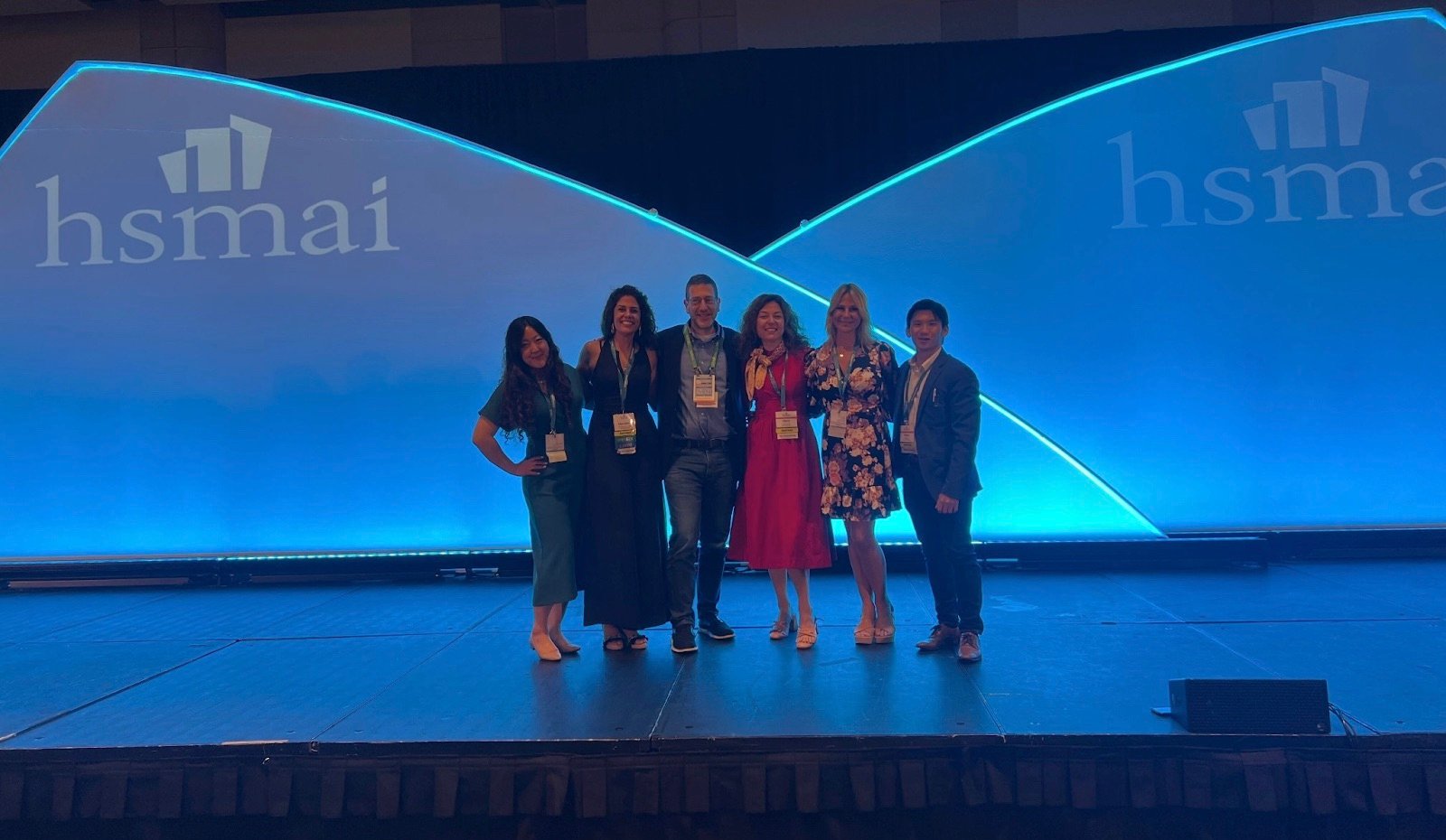
ABOUT THE AUTHOR
Michael J. Goldrich, THN's Chief Experience Officer. After spending nearly two decades in digital marketing and project leadership for multimillion-dollar brands and startups, Michael knows what truly drives website engagement and conversions – and it’s not by leveraging the marketing trend of the month. It’s how well you connect with the potential guests you’re trying to help and communicate your understanding back to them.

